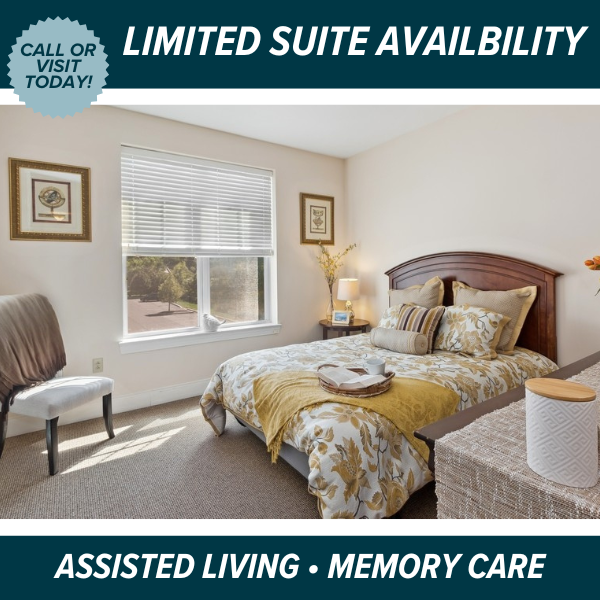Being a caregiver to a loved one in their time of need can be a fulfilling yet demanding role. Even for the most resilient, positive caregiver, it’s not always an easy experience. There’s nothing to be ashamed of. Having extra support goes a long way in providing quality care.
There are options for families to find short-term relief for caregivers: respite care. Examples of when to access respite care for seniors can include to avoid caregiver burnout, when the caregiver needs to travel or is undergoing home repairs, or if a senior requires assistance during recovery. No matter the need, there are care options to help keep your loved one safe and healthy.
What Is Respite Care?
Respite care offers temporary assisted living accommodations to your loved one and provides short-term relief to primary caregivers. Many older adults don’t require a full-time caregiver. They can often live independently and have family check in with them only a handful of times weekly.
An older adult may only require assistance during a period of recovery. No matter the kind of care needed, respite care can be a great option when you need an extra set of hands.
Senior living communities can provideout-of-home respite care. For those that offer short term stays, arrangements can be made for your loved ones, where they have access to the same care and amenities permanent residents receive. We can assess your loved one’s needs and develop a plan tailored to the level of care they will need.
Why Respite Care Matters
Caring for a loved one can be one of the most rewarding responsibilities you’ll ever take on, but it’s also one of the most demanding. In a 2020 survey, more than 66% of unpaid caregivers for older adults reported at least one adverse mental or behavioral health symptom in the 30 days before taking the survey. Respite care offers short-term relief that protects both the caregiver’s well-being and the senior’s health and safety.
Reasons to Use Respite Care
Help Avoid Caregiver Burnout
It may be hard for a caregiver to accept that they need a break from the physical and emotional demands of caregiving. Caregiver burnout is common and important to address. If left unchecked, burnout can lead to exhaustion that affects both oneself and the quality of care one can provide.
As their primary caregiver, you may feel hesitant to hand over the responsibility of care as you have established a routine that works for both parties. Remember, it takes a community of people to provide quality care that your loved one and yourself deserve. Respite care options allow you to keep connected with your loved one and develop a plan to provide quality care in line with their needs.
Many caregivers also juggle full-time jobs alongside caregiving duties. Respite care can cover busier seasons or working away from home to ensure your loved one continues to receive consistent attention.
Making Arrangements for a Trip
Respite care is a good option for caregivers going away for a few days. To keep your loved one prepared and at ease for your leave, inform them about your plans and the change in schedule ahead of time.
It can be helpful to provide the respite care aid with some insight concerning how to care for your loved one. These insights may include suggestions, a breakdown of the schedule, and your loved one’s likes and dislikes. The added guidance will help maintain the routine flow without overwhelming your loved one.
Undergoing Home Repairs
Periods of home repairs and renovations can make the house less accessible for your loved one. The environment can be stressful and overstimulating. Some caregivers may decide it’s best to pursue respite care during this period.
Daily life in respite care at a senior living community is similar to that of a long-term resident. Respite care residents are provided the same services and amenities as residents, which include having a well-care team, personal care, meals, social community, and assistance with tasks.
Extra Support Post-Surgery, Injury, or Rehabilitation Recovery
Respite care can be helpful when your loved one needs assistance in recovery, whether from surgery, injury recovery, or rehabilitation. The training respite care workers are equipped with can be beneficial during your loved one’s recovery period. As their caregiver, having professional help can provide you with tips and suggestions on how to manage certain tasks.
Benefits of Respite Care for Seniors
Respite care isn’t only a relief for caregivers — it can be uplifting for the senior too.
- Social Interaction: Seniors can meet new people, participate in activities, and enjoy communal meals.
- Routine & Safety: Professional staff help maintain medication schedules and daily routines.
- Access to Amenities: Residents enjoy the same dining, wellness, and therapy programs as long-term residents.
- Peace of Mind: Both caregivers and seniors gain reassurance knowing help is available around the clock.
How to Prepare for a Respite Stay
A smooth transition helps your loved one feel comfortable and ensures the care team has what they need.
- Create a medication list with dosages and timing.
- Pack familiar items, such as a favourite blanket, photos, or reading glasses, to make the room feel homier.
- Share daily routines and preferences (meal choices, hobbies, bedtime habits).
- Provide emergency contacts and any special instructions in writing.
Frequently Asked Questions About Respite Care
How long can respite care last?
It can be as brief as a few days or as long as several weeks, depending on the community’s availability and your family’s needs.
Does insurance cover respite care?
Coverage varies. Some long-term care insurance or veterans’ programs may help. Families often pay privately or through benefits packages.
Can a senior try respite care to ‘test’ a community?
Yes. Many families use short-term stays as a way to experience the lifestyle, staff, and amenities before deciding on long-term care.
Is medical support available during respite stays?
At The Bridges at Warwick, respite residents have access to the same professional care team, medication management, and emergency support as permanent residents.
Get Help Planning Respite Care
At The Bridges at Warwick, our respite care program was created to provide short-term relief to caregivers and their loved ones while they are in a senior living community. The Bridges at Warwick uniquely combines hospitality with professional care. We call it Lifestyle Plus. We even offer our Bridge App to ensure good communication between our team, residents and their families. Contact us to discover why the respite care community at The Bridges at Warwick can be a good fit for your family.









